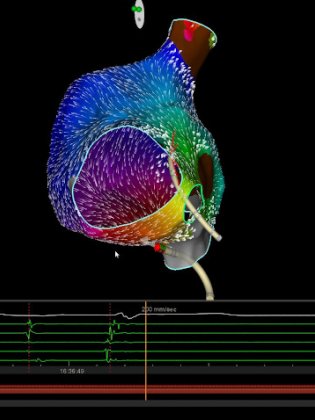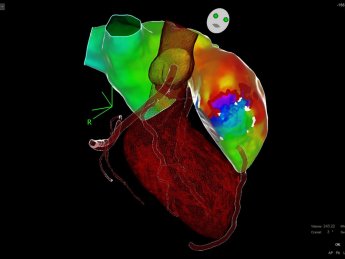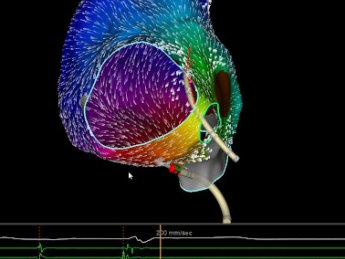Cardiac Rhythm Disorders
INTERVENTIONAL ARRHYTHMIA CENTER : Treating and Curing Cardiac Rhythm Disorders
As in any electrical system, short circuits can occur, causing abnormal heart rate variations. Known as arrhythmias, these variations critically impact the heart’s ability to work properly. Their consequences can be debilitating and, in some cases, lethal.
Within the Hospital’s cardiology unit, our ultra-specialized interventional arrhythmia center, headed by Dr. Thierry Zerah, observes, identifies and cures cardiac rhythm disorders using radiofrequency ablation and cryoablation techniques.
As we all know, the rhythm of our heartbeat is a vital indicator of our overall state of health. It therefore comes
as no surprise that heart palpitations are the most common reason for cardiology consultations – and rightly so. While palpitations are generally benign, they can be symptomatic of an underlying heart condition and require a specific check-up by a cardiologist specialized in heart rhythm.
Les palpitations peuvent provenir d’une arythmie cardiaque. Paradoxalement, les moins bien tolérées ne sont pas forcément les plus graves : ce n’est pas le ressenti, mais la localisation de l’arythmie qui en détermine la gravité. Lorsqu’elle survient au niveau des ventricules, elle peut entrainer la mort du patient en quelques minutes seulement. Si elle se situe au niveau des oreillettes – comme dans le cas de la fibrillation atriale qui représente environ 90 % des cas d’arythmie – elle ne constitue pas une urgence vitale à la minute. Mais elle peut entrainer des symptômes invalidants et, surtout, des embolies cérébrales avec accidents vasculaires cérébraux. Il est donc impératif de traiter le patient, le plus tôt étant bien sûr une condition sine qua non de succès.
Better Screening for Atrial Fibrillation Improves Chances of Recovery
The main challenge facing heart rhythm specialists is getting patients to act early. Arrhythmia advances in phases: The more you let it linger, the graver the consequences for the patient’s life and health. After age 40, one in every four adults will develop atrial fibrillation. It is therefore easy to imagine the large-scale financial impact of the disease.
- When diagnosed at Stage 1, known as “paroxysmal,” the condition can be cured in 90 percent of cases. At this stage, the atrium is not yet dilated, arrhythmia episodes occur infrequently, and the heart can resume its normal rhythm on its own.
- In Stage 2 of atrial fibrillation, known as “persistent,” the atrium starts to dilate and the arrhythmia occurs more frequently. To reset the heart’s rhythm to normal, medicine or electric shocks to the heart are necessary. The recovery rate drops to 60 percent.
- In Stage 3, atrial fibrillation is “permanent” and no further treatment options remain.
To treat atrial fibrillation, early detection is therefore essential. The cardiologist, of course, plays a crucial role, and any symptoms must be thoroughly investigated by a heart rhythm specialist. Research has also helped identify lifestyle risk factors associated with certain pathologies. In the absence of symptoms, these factors serve as a warning and suggest that screening for the disease is necessary, all the more so since improved diagnostic methods now enable specialists to detect arrhythmia at its onset and cure it definitively.
HOW IS ATRIAL FIBRILLATION DIAGNOSED?
How is atrial fibrillation diagnosed?
Heart rhythm specialists use many high-performance diagnostic tools and can recommend:
- A complete lab work-up, including an electrolyte test
- A transthoracic echocardiogram to detect a structural abnormality in the heart
- A prolonged electrocardiogram (up to two weeks) via Holter monitor
- An electrophysiological study to test the heart’s electrical activity
- A loop recorder implantation and/or heart MRI

Radiofrequency Ablation and Cryoablation:


